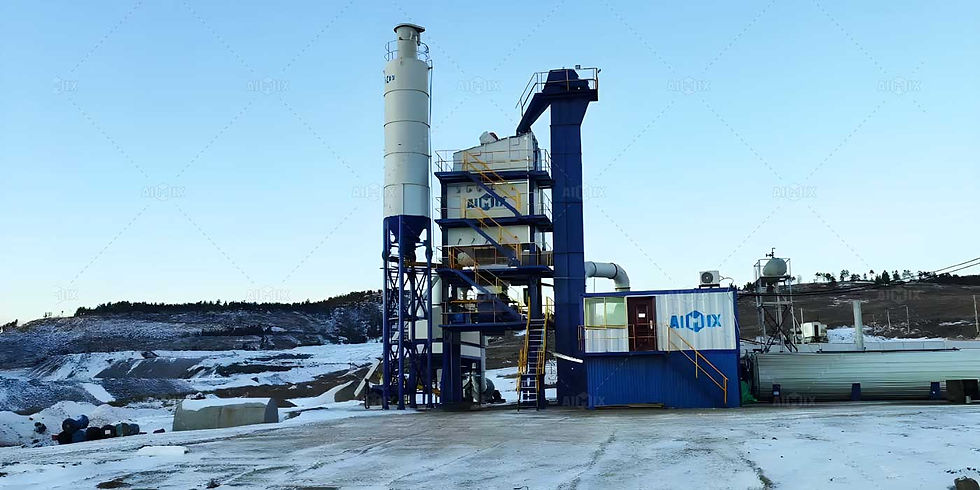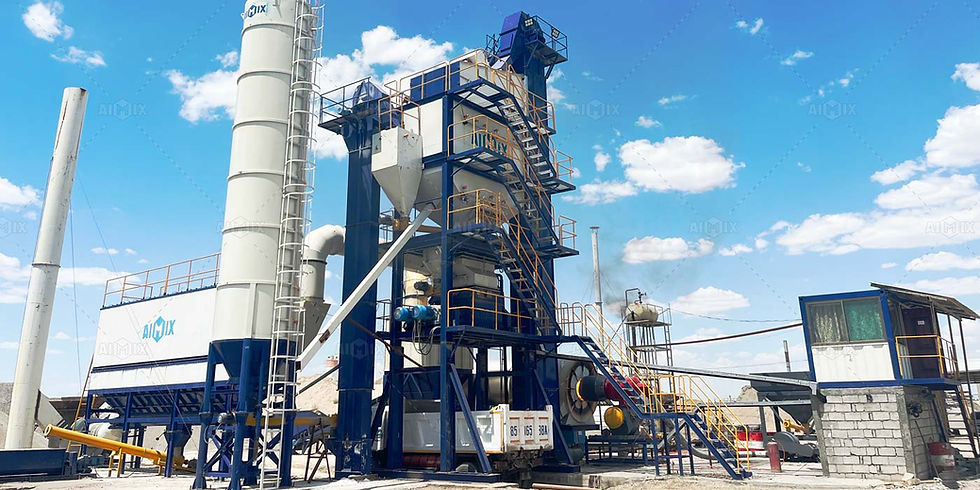What are the Cost Differences Between Mobile and Stationary Asphalt Mixing Plants, and Which is Better for My Project?
- aimixglobal5
- Mar 23, 2025
- 4 min read
Choosing the right asphalt mixing plant for your project can be a complex decision. With numerous options available, understanding the cost differences between mobile and stationary asphalt mixing plants is crucial to making an informed choice. In this article, we will explore the key factors that influence the cost of these two types of asphalt plants and help you decide which one suits your project needs. By the end, you’ll have a clearer understanding of which asphalt plant is the most cost-effective and efficient for your specific requirements.

Understanding Mobile Asphalt Mixing Plants
Mobile asphalt mixing plants are designed for flexibility and portability. They are ideal for projects where the site location may change frequently or where temporary asphalt production is needed. These mobile asphalt plants are typically smaller and come equipped with wheels, making them easy to move from one construction site to another.
In terms of cost, mobile asphalt plants tend to have a higher upfront price compared to stationary plants. This is due to their advanced features, mobility, and the added infrastructure required for transportation. However, this higher initial investment can be offset by their ability to be reused on multiple projects, potentially lowering the overall cost per project.
One of the primary advantages of mobile plants is that they require less time to set up and take down. This means they can start production much faster, which is essential for projects that need to be completed quickly. Furthermore, their mobility allows them to be used for smaller or short-term projects, reducing long-term operational costs.
Understanding Stationary Asphalt Mixing Plants
Stationary asphalt mixing plants, on the other hand, are designed for long-term use at a fixed location. These plants are typically larger and more powerful, capable of producing asphalt in high volumes for large-scale projects. Stationary plants are more suitable for projects that require continuous, high-output production, such as highways or large commercial developments.
The cost of a stationary asphalt mixing plant is generally lower in terms of initial investment compared to a mobile plant. These plants are built to stay in one location, and thus, they do not require the mobility features that mobile plants do. As a result, stationary plants are often more affordable for large-scale operations with a consistent and high-volume need for asphalt.
However, stationary plants do come with some disadvantages. They require more time to install and set up, and they are not as flexible in terms of relocation. This means that if your project location changes or you need to transport the plant to a different site, you may face additional costs for dismantling and reinstalling the plant.

Key Cost Differences Between Mobile and Stationary Asphalt Mixing Plants
Now that we have a basic understanding of both mobile and stationary asphalt plants, let’s break down the key cost differences:
1. Initial Investment
The initial investment for a mobile asphalt mixing plant is usually higher due to its portability and advanced technology. However, the cost of a stationary plant is generally lower, as it lacks the mobility features that mobile plants possess.
2. Transportation and Setup Costs
Mobile plants are designed for easy transportation, which makes them more expensive to transport than stationary plants. Although they can be set up quickly, they still incur transportation fees. In contrast, stationary plants incur lower transportation costs but require a longer setup time, which could lead to additional labor costs.
3. Operating and Maintenance Costs
Mobile asphalt mixing plants require more frequent maintenance due to their mobility and the wear-and-tear associated with moving between job sites. Stationary plants, on the other hand, are less prone to wear and tear, but they may have higher operational costs due to their larger size and higher power consumption.
4. Lifespan and Resale Value
Both types of plants have a long lifespan, but mobile plants may have a slightly shorter operational life due to their frequent movement and use on different sites. Stationary plants, while potentially more durable in the long term, may have a lower resale value if the project site changes frequently.

Which Type of Asphalt Mixing Plant is Better for My Project?
Deciding whether a mobile or stationary asphalt mixing plant is better for your project depends largely on the scope and location of your project, as well as your budget. If you are working on a large-scale, long-term project that requires high volumes of asphalt and the plant will remain at one location, a stationary plant may be the most cost-effective option in the long run.
However, if your project involves multiple smaller sites or a short-term operation, a mobile asphalt mixing plant could be more beneficial. Its flexibility and ease of relocation can save time and money, particularly if you expect to move the plant between different locations regularly.
Additionally, consider your long-term goals. If you need a plant that can adapt to various types of projects, a mobile plant may offer the versatility required for future operations. On the other hand, if your focus is on consistent, high-output asphalt production for a specific project, a stationary plant may be more suitable.
Why Choose AIMIX Asphalt Mixing Plants?
AIMIX offers a wide range of asphalt mixing plants, both mobile and stationary, designed to meet the needs of various construction projects. Our mobile plants provide exceptional portability and quick setup, while our stationary plants deliver high-output production and long-term efficiency. With AIMIX, you get a cost-effective solution tailored to your specific project requirements. Our plants are built with high-quality materials, ensuring durability and reliable performance.
If you’re unsure which type of asphalt mixing plant is best for your project, our team at AIMIX can assist you in making an informed decision. Contact us today to learn more about our products and how we can help you achieve success in your construction projects.

Conclusion
Choosing between a mobile and stationary asphalt mixing plant requires careful consideration of several factors, including cost, project scope, and location. Both types of plants offer unique advantages, and understanding the differences will help you make a more informed decision. Whether you opt for the flexibility of a mobile asphalt plant or the power of a stationary asphalt plant, AIMIX has the right solution for your needs. Contact us now to find out more and get started on your project today!



Comments